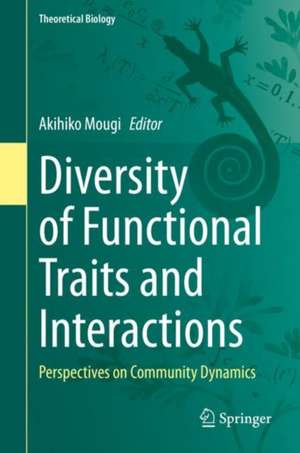Diversity of Functional Traits and Interactions: Perspectives on Community Dynamics: Theoretical Biology
Editat de Akihiko Mougien Limba Engleză Hardback – 31 oct 2020
| Toate formatele și edițiile | Preț | Express |
|---|---|---|
| Paperback (1) | 636.80 lei 6-8 săpt. | |
| Springer Nature Singapore – noi 2021 | 636.80 lei 6-8 săpt. | |
| Hardback (1) | 562.86 lei 38-45 zile | |
| Springer Nature Singapore – 31 oct 2020 | 562.86 lei 38-45 zile |
Preț: 562.86 lei
Preț vechi: 703.57 lei
-20% Nou
Puncte Express: 844
Preț estimativ în valută:
107.71€ • 115.17$ • 89.80£
107.71€ • 115.17$ • 89.80£
Carte tipărită la comandă
Livrare economică 14-21 aprilie
Preluare comenzi: 021 569.72.76
Specificații
ISBN-13: 9789811579523
ISBN-10: 9811579520
Pagini: 213
Ilustrații: VIII, 213 p. 72 illus., 35 illus. in color.
Dimensiuni: 155 x 235 mm
Greutate: 0.45 kg
Ediția:1st ed. 2020
Editura: Springer Nature Singapore
Colecția Springer
Seria Theoretical Biology
Locul publicării:Singapore, Singapore
ISBN-10: 9811579520
Pagini: 213
Ilustrații: VIII, 213 p. 72 illus., 35 illus. in color.
Dimensiuni: 155 x 235 mm
Greutate: 0.45 kg
Ediția:1st ed. 2020
Editura: Springer Nature Singapore
Colecția Springer
Seria Theoretical Biology
Locul publicării:Singapore, Singapore
Cuprins
Part 1. Intra-specific trait diversity.- Chapter 1. Incorporating ontogenetic niche shifts into hybrid community dynamics.- Chapter 2. Effects of rapid evolution on population cycles and extinction in predator-prey systems.- Chapter 3. The possibility that the evolution of sexual traits stabilizes ecological communities.- Chapter 4. Spatiality and community stability.- Part 2. Inter-specific trait and functional diversity.- Chapter 5. Direct and Indirect Effects of Facilitation and Competition in Ecological.- Chapter 6. Mathematical modeling on microbes and their roles in community and ecosystem: how to handle microbial diversity in modeling?.- Part 3. Diversity of inter-specific interaction.- Chapter 7. Ecology and evolution of density-dependence.- Chapter 8. Interaction-type diversity and community stability.- Part 4. A novel approach in community ecology.- Chapter 9. Forecasting ecological time series using empirical dynamic modeling: a tutorial for simplex projection and S-map.
Notă biografică
Akihiko Mougi is an associate professor in the Faculty of Life and Environmental Sciences at the Shimane University. He completed his Ph.D. at Hokkaido University and did postdoctoral work at the Kyushu University and Ryukoku University. His research uses mathematical models to understand ecological and evolutionary dynamics of biological communities and the stability of ecosystems.
Textul de pe ultima copertă
This book presents new theoretical perspectives on ecological community dynamics and in so doing casts fresh light on the enduring complexity–stability debate. Real ecological communities do not simply comprise diverse species and interactions, which respectively represented the nodes and links of the classic network theory. Rather, they are characterized by different types of complexity, and this book explains how this diversity of complexity is key to understanding the dynamics of ecological communities. It is shown how various properties in natural communities, such as life history, adaptation, density dependence, sex, interaction types, space, functional traits, and microbial processes, can dramatically increase the complexity in ecological communities. Furthermore, innovative methods are introduced that may be applied to cast light on very complex communities. With each chapter presenting the latest advances and approaches, the book sets the direction for future research on ecological community dynamics. It will be a “must read” for researchers and students in the field of ecology.
Caracteristici
Presents the most up-to-date research regarding theoretical perspectives on community dynamics Provides novel viewpoints on the complexity–stability debate Explains new methods for studying complex community dynamics








